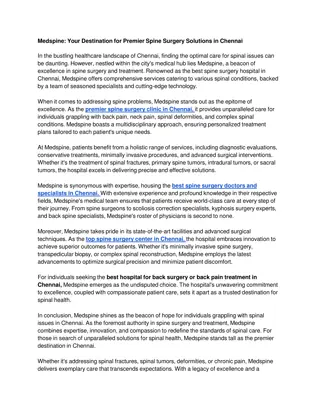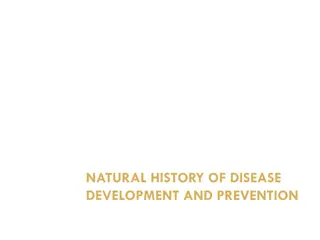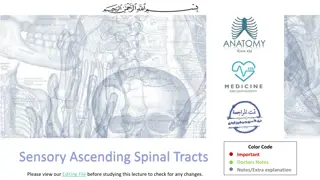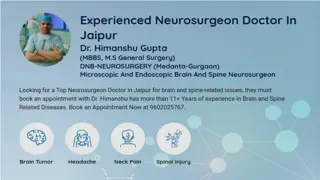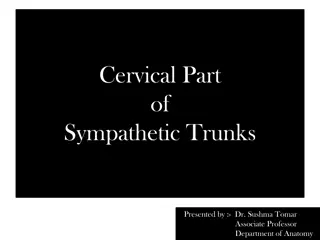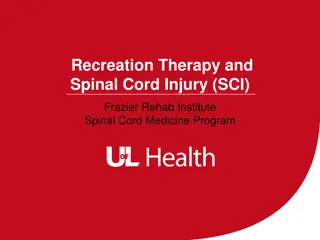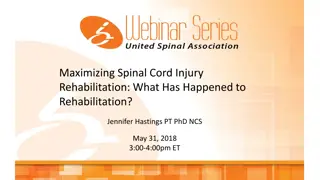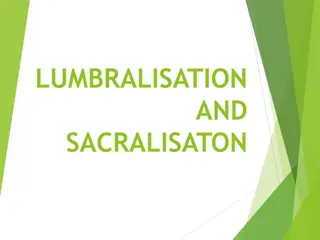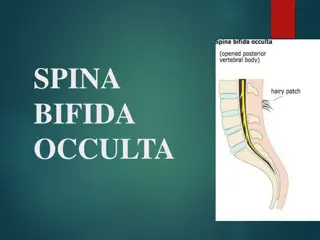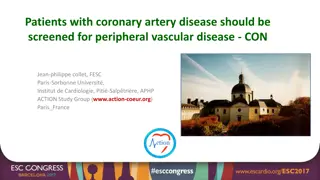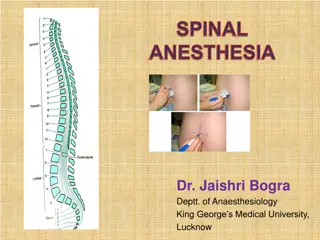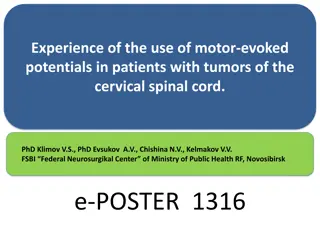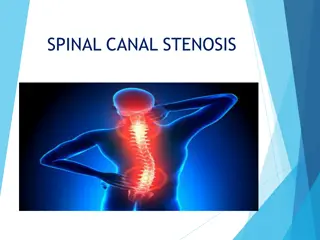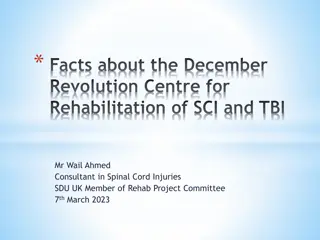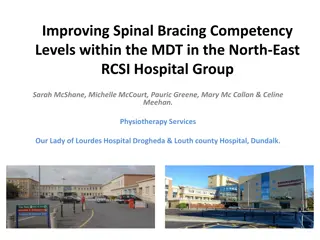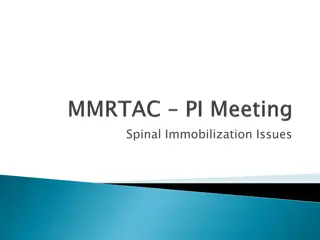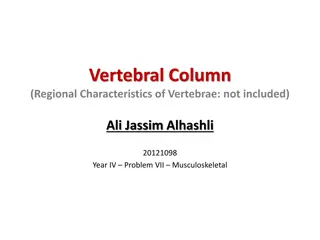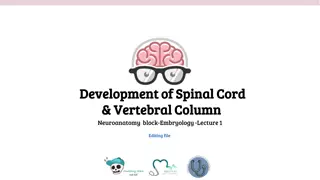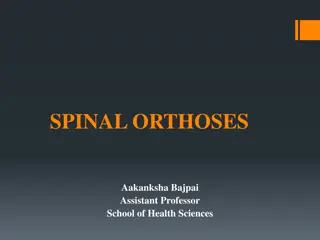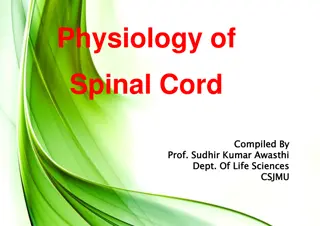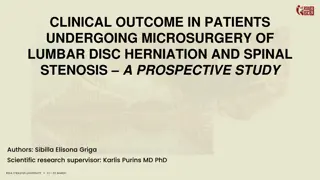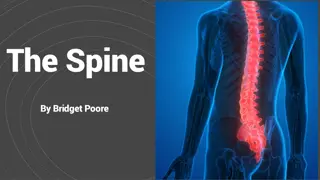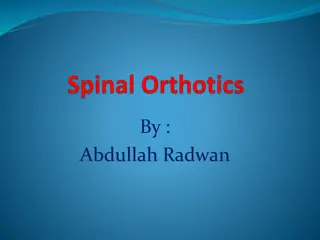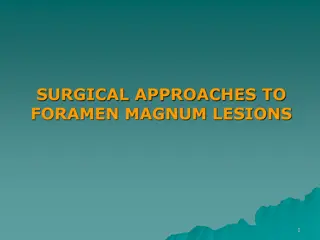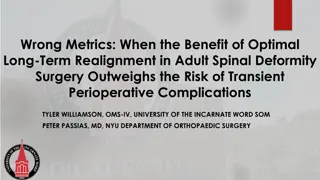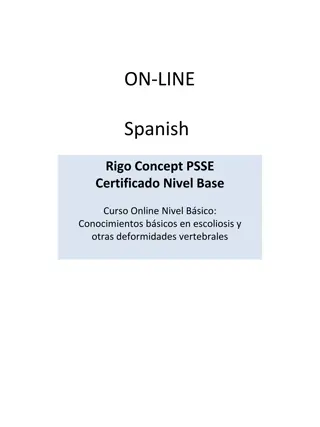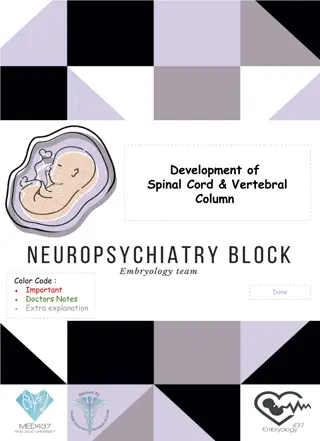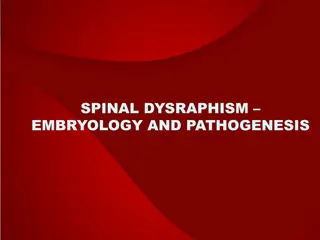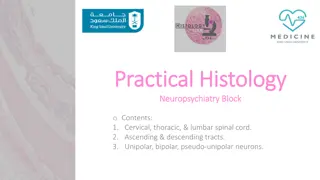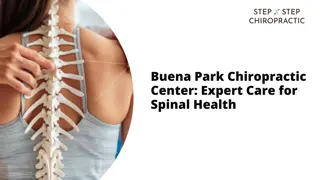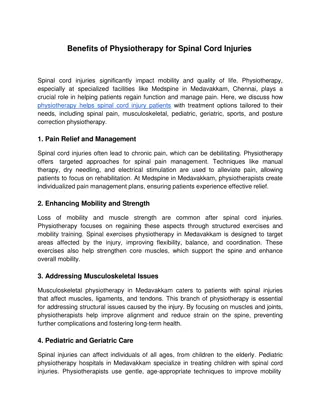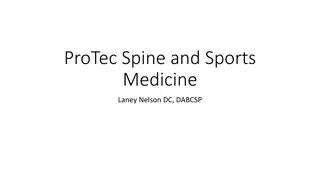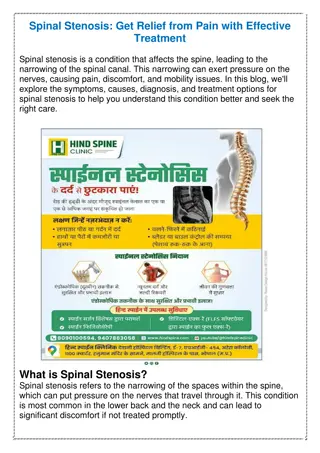Spinal injuries
An overview of spinal injuries, including anatomy revision, types of spinal fractures, assessment, management, and common patterns of injuries. It also covers back pain presentation, red flags, differentials, and the structure of vertebrae. The Denis classification of spinal fractures and the most c
3 views • 40 slides
Medspine_ Your Destination for Premier Spine Surgery Solutions in Chennai
Medspine: Your Destination for Premier Spine Surgery Solutions in Chennai\n\nIn the bustling healthcare landscape of Chennai, finding the optimal care for spinal issues can be daunting. However, nestled within the city's medical hub lies Medspine, a beacon of excellence in spine surgery and treatmen
0 views • 2 slides
Medspine_ Your Destination for Premier Spine Surgery Solutions in Chennai(27_03_2024)
Medspine: Your Destination for Premier Spine Surgery Solutions in Chennai\n\nIn the bustling healthcare landscape of Chennai, finding the optimal care for spinal issues can be daunting. However, nestled within the city's medical hub lies Medspine, a beacon of excellence in spine surgery and treatmen
1 views • 2 slides
Understanding the Natural History of Disease Development and Prevention
The natural history of disease development outlines the progression of a disease in an individual without intervention, from exposure to outcome. Learning objectives include defining prevention terms, understanding disease severity, prevention levels, and intervention measures. Studying disease prog
4 views • 16 slides
Sensory Ascending Spinal Tracts
Learn about sensory ascending spinal tracts, their classification, functions, and pathways. Explore how information is carried to the brain at conscious and subconscious levels through different types of sensations. Gain insights into the organization of white matter tracts and their importance in s
4 views • 22 slides
_Best Neurosurgeon Doctor In Jaipur || Dr Himanshu Gupta || drhimanshugupta.com
Dr. Himanshu Gupta is known not only for his mastery of surgical techniques, particularly in microsurgery and Endosurgery for brain tumors but also for his exceptional skills in managing patients requiring trauma, brain, and spine surgeries.\n\nHis focus lies in exclusive neurosurgery, making him a
0 views • 7 slides
Understanding the Cervical Part of Sympathetic Trunks
The sympathetic trunks play a crucial role in the human body, with the cervical part located in front of the transverse processes of cervical vertebrae and the neck of the 1st rib. This part presents three ganglia - superior, middle, and inferior. Sometimes, the inferior cervical and first thoracic
0 views • 25 slides
Comprehensive Recreation Therapy for Spinal Cord Injury Patients
Recreation therapy for individuals with spinal cord injuries at Frazier Rehab Institute focuses on developing life skills, community reintegration, education and support in various areas, leisure education, awareness, and community re-integration. The program provides opportunities for individuals t
0 views • 13 slides
Maximizing Spinal Cord Injury Rehabilitation: Insights and Advocacy Efforts
Explore the journey of spinal cord injury rehabilitation, challenges faced, and advocacy efforts by organizations like United Spinal Association. The impact of sudden onset spinal cord injuries on various aspects of life is highlighted, along with the importance of support and legislative advocacy.
1 views • 27 slides
Understanding Lumbarisation and Sacralisation in Human Spine
The human spine comprises the cervical, thoracic, lumbar, sacral, and coccyx vertebrae. Lumbarisation refers to the non-fusion of the uppermost sacral segment, while sacralisation involves fusion of the fifth lumbar vertebra with the sacrum. Lumbarisation can cause issues such as back pain, inflamma
0 views • 14 slides
Understanding Degenerative Spine Disease and Disc Degeneration
Degenerative spine disease is a prevalent condition affecting millions, leading to substantial healthcare costs. The anatomy and physiology of spine degeneration involve the three-joint complex theory. Pathologically, disc degeneration impacts the nucleus pulposus and annulus fibrosis, contributing
0 views • 37 slides
Understanding Spina Bifida Occulta: Symptoms, Causes, and Treatment
Spina Bifida Occulta is a common neural tube defect, usually mild and hidden. It affects the lumbosacral area, characterized by vertebral arches not fusing, resulting in spinal processes defects without external protrusion. Common features include dimples, hairy patches, and normal spinal cord. Neur
0 views • 10 slides
Screening for Peripheral Vascular Disease in Patients with Coronary Artery Disease
Patients with coronary artery disease should be screened for peripheral vascular disease as it is a frequent integrator of global cardiovascular risk. The association of atherosclerosis in various arterial diseases highlights the importance of identifying multisite artery disease. The prevalence and
0 views • 23 slides
An Overview of Spinal Anesthesia in Regional Anesthesia Practice
Regional anesthesia, specifically spinal anesthesia, is a valuable technique involving the application of local anesthetic around a nerve to reduce or prevent impulse transmission. This method offers numerous advantages, such as cost-effectiveness, respiratory support, and post-operative pain relief
0 views • 46 slides
Use of Motor-Evoked Potentials in Cervical Spinal Cord Tumor Patients
Neurophysiological intraoperative monitoring using motor-evoked potentials is crucial in evaluating spinal cord function during surgery for cervical spinal cord tumors. This study examines the relationship between neurological changes and intraoperative motor-evoked potentials in patients, aiming to
0 views • 8 slides
Human Disease Symptom Network: Understanding Disease Relationships Through Symptoms and Genes
The Human Disease Symptom Network (HSDN) is constructed using a large-scale medical bibliographic records database to form a network of human diseases based on symptom similarities. By integrating disease-gene associations and protein-protein interaction data, correlations between symptom similarity
0 views • 37 slides
Understanding Spinal Canal Stenosis: Causes, Symptoms, and Classification
Spinal canal stenosis is the abnormal narrowing of the spinal canal or intervertebral foramina, leading to compression of nerves and blood vessels. It can result in symptoms such as radiculopathy, claudication, myelopathy, and more. Cervical stenosis presents with arm pain and weakness, while lumbar
0 views • 18 slides
Development of a Tertiary Neurological Rehabilitation Centre in Sudan
The December Revolution Centre for Rehabilitation of Traumatic Spinal Cord and Brain Injuries at Khartoum Teaching Hospital addresses the lack of holistic patient-centered rehabilitation services in Sudan. Following the December 2018 Revolution, the need for specialized care for victims with spinal
0 views • 11 slides
Transforming Spinal Pathology Care: Belgian Registry Startup Journey
Experience the journey of establishing a national registry for spinal pathologies in Belgium, led by Johan G. Van Lerbeirghe. Explore the goals, history, and the significance of choosing Spine Tango as the registry platform. Witness the challenges, partnerships, and milestones in the Belgian Pilot p
0 views • 14 slides
Enhancing Spinal Bracing Competency in Healthcare Settings
This quality improvement project aimed to elevate spinal bracing competency among healthcare staff in the North-East RCSI Hospital Group. By focusing on training and upskilling physiotherapy, nursing, and healthcare assistant staff, the project successfully increased knowledge and understanding of s
0 views • 4 slides
Spinal Immobilization in Trauma: Case Study and Considerations
A 70-year-old male with trauma after falling 20 feet was managed at the ED, demonstrating tenderness in the mid thoracic spine and other injuries. Despite negative cervical spine imaging, the patient underwent interventions for spinal fractures. The decision to transfer without a backboard highlight
0 views • 34 slides
Understanding the Vertebral Column and Abnormal Curvatures
The vertebral column, extending from the cranium to the coccyx, plays vital roles in protecting the spinal cord, providing support, and facilitating movement. It consists of 33 vertebrae arranged in 5 regions, each with specific functions and characteristics. The column's curvatures, including cervi
0 views • 12 slides
Embryology of Spinal Cord and Vertebral Column Development
Explore the fascinating embryological journey of the spinal cord and vertebral column development, covering topics such as neural tube formation, layers of the spinal cord, subdivisions of mantle and marginal zones, chondrification, ossification stages, spina bifida types, and more. Dive into the st
1 views • 15 slides
Understanding Spinal Orthoses: Types, Uses, and Benefits
Spinal orthoses are back braces used to treat spinal disorders and injuries. They provide support, limit movement, and aid in healing. Orthoses are prescribed to realign the spine, immobilize it, limit mobility, and support weakened areas. Various types of orthoses are available based on the segment
0 views • 38 slides
Understanding the Physiology of the Spinal Cord
The spinal cord serves as the information highway between the brain and body, allowing for sensory input reception and motor signal transmission. It plays a crucial role in locomotion, reflex responses, and overall coordination of muscle activities. The cylinder of nerve tissue within the vertebral
0 views • 18 slides
Clinical Outcomes in Microsurgery for Lumbar Disc Herniation: Prospective Study
This prospective study examined the clinical outcomes in patients undergoing microsurgery for lumbar disc herniation and spinal stenosis. The study evaluated the effectiveness of surgical intervention using the Oswestry Disability Index (ODI) and Numeric Rating Scale (NRS) questionnaires preoperativ
0 views • 13 slides
Understanding Joint Disabilities and Ankylosis in Spinal Health
Factors contributing to joint disabilities in spinal health include limited or excessive movement, muscle weakness, and fatigue. Painful motion, muscle spasm, and joint alignment issues can indicate disability. Ankylosis, seen in conditions like ankylosing spondylitis, results in joint fusion and im
0 views • 19 slides
Understanding Orthoses: Types, Indications, Mechanisms, and Effects
Orthoses are mechanical devices used to support, stabilize, and protect various body parts. They can be categorized into different types such as cervical, cervicothoracic, thoracolumbosacral, lumbosacral, and sacroiliac orthoses. Indications for spinal orthotics include stabilizing the spine after a
0 views • 34 slides
Surgical Approaches to Foramen Magnum Lesions: Anatomy and Considerations
Surgical approaches to foramen magnum lesions involve understanding the anatomical structures, diameters, condyles, and contents of the region. Critical considerations include the choice of surgical approach based on the location and extent of the lesion, size, and nature of the pathology. Approache
0 views • 53 slides
Benefit of Long-Term Realignment in Adult Spinal Deformity Surgery
Recent literature highlights the benefits of surgical intervention for adult spinal deformity, despite the potential for transient perioperative complications. This study aims to explore the long-term outcomes of optimal realignment in ASD surgery, emphasizing the significance of achieving improved
0 views • 14 slides
Certification in Rigo Concept PSSE for Scoliosis and Spinal Deformities
This online course offers a base level certification in Rigo Concept PSSE, focusing on essential knowledge of scoliosis and other spinal deformities. Led by renowned professionals in the field, successful completion of the course allows access to further levels of certification for specific physical
0 views • 12 slides
Development of Spinal Cord and Vertebral Column - Doctors' Notes
The development of the spinal cord from the neural tube, layers of the spinal cord, subdivisions of mantle and marginal zones, meningeal layers, vertebral column development, chondrification, ossification stages, spina bifida types, and positional changes of the spinal cord are crucial aspects cover
0 views • 10 slides
Embryology and Pathogenesis of Spinal Dysraphism
Gastrulation, the formation of germ layers, mesoderm, and endoderm, in the embryo occurs during the third week of gestation with the appearance of the primitive streak. Cells migrate to form endoderm and mesoderm while the ectoderm remains. Neural induction is regulated by factors like fibroblast gr
0 views • 49 slides
Practical Histology: Spinal Cord Tracts and Neurons Overview
This practical histology guide covers the cervical, thoracic, and lumbar spinal cord segments, along with ascending and descending tracts, and pseudo-unipolar/unipolar neurons. It emphasizes key features such as the ventral and dorsal horns, gracile and cuneate tracts, and provides essential informa
1 views • 12 slides
Buena Park Chiropractic Center Expert Care for Spinal Health
At Buena Park Chiropractic Center, we provide expert care to enhance your spinal health. Our experienced team offers personalized treatments to relieve pain, improve mobility, and promote overall wellness. Whether you're dealing with chronic discomfo
0 views • 6 slides
Benefits of Physiotherapy for Spinal Cord Injuries
Physiotherapy is an extreely important part of treatment for spinal problems. Multiple physiotherapy modalities are useful in relieving spinal pain. Personalisedexercise programs are tailored to each patient\u2019s Specific Problems.
0 views • 2 slides
Understanding the Role of Multifidus Muscle in Spinal Health
Exploring the multifaceted role of the multifidus muscle in lumbar spine stability and control through histochemical studies and clinical comparisons. Insights into muscle changes with spinal conditions and the importance of maintaining its integrity for overall spinal health are discussed.
0 views • 26 slides
Spinal Stenosis - Hind Spine clinic
At Hind Spine Clinic, Bhopal, we specialize in treating spinal stenosis, a condition that can significantly impact daily life due to chronic pain and discomfort. With advanced and effective treatment options, our expert team is dedicated to helping p
3 views • 6 slides
United Spinal Association: Empowering People with Disabilities
The United Spinal Association is dedicated to enhancing the quality of life for wheelchair users and the broader disability community. With over 75 years of commitment, they empower individuals with spinal cord injuries and disorders to achieve the highest possible quality of life through advocacy,
0 views • 7 slides
United Spinal Association: Empowering Individuals with Disabilities
United Spinal Association is dedicated to enhancing the quality of life for wheelchair users and individuals with spinal cord injuries and disorders. With over 75 years of experience, they provide support, advocacy, and resources to empower people with disabilities to achieve their fullest potential
0 views • 7 slides


